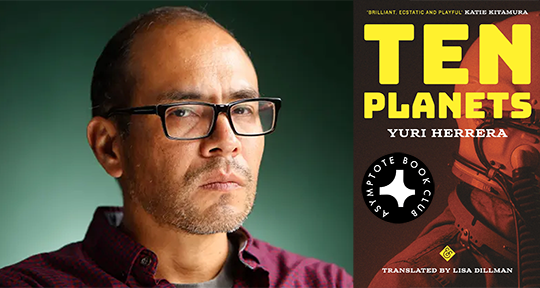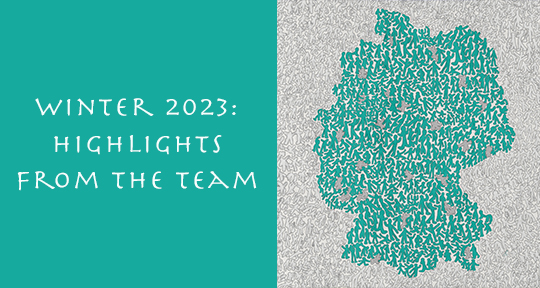This week, our editors are bringing some very exciting news from the ground. In India, a working-class writer has been lauded by the prestigious Kerala Literary Academy, and a new documentary has been unveiled with one of our favourite publishers, Seagull Books, as its subject. In Mexico, the country celebrates its most promising young writers with a week-long festival. And in Spain, a comics festival sees the medium undergoing some radical new developments—including, surprisingly, a venture into audiobooks.
Zohra Salih, Editor-at-Large, reporting from India
Without a doubt, the most heartening literary news we received this month was that of Akhil Kavintarikath being feted by the Kerala Literary Academy. Akhil, at twenty-eight years old, won the academy’s annual Geetha Hiranyan endowment award for his 2020 short-story collection, Neelachadayan. This is an especially significant recognition because of Akhil’s unconventional background; he works as a JCB construction operator at a sand mine by night and a newspaper delivery man in the morning—quite contrary to the popular image of a young and upcoming novelist these days. As a fellow aspiring writer and friend commented while forwarding the link to the news to me, “Now we don’t have any excuses for not practicing our craft!” I completely agree, what better incentive can there be!
Akhil, who hails from a small village in Kannur in the southern state of Kerala, dropped out of school at the mere age of sixteen to support his family by doing odd jobs, all the while sustaining a deeply personal passion for literature and writing. He found inspiration in the mundane, managing to read a few lines here and there from the stories in the newspapers he would deliver, and then, with curiosity getting the better of him, filling in the blanks through inventive speculation. It was this curiosity to delve into the lives around him that drove him to write. This was further bolstered by his time spent working in the mines during night shifts, where the same imagination served as an antidote to the fear and loneliness that accompanied the dark.
Akhil has since authored Story of Lion in 2021, which draws from the ancient practice of theyyam, followed by Tharakanthan in 2022, which is inspired by the epic Ramayana; both are released by Mathrubhumi Books, one of Kerala’s foremost publishing houses. However, winning the prestigious honor has not meant that the tides have completely turned for Akhil, as the reality is that the award money is not enough for him to leave his job and commit to writing full time. This only underscores the need for more avenues in India to support such talent, through both monetary and social encouragement, lest we lose their brilliant voices to the margins.
Speaking of unconventional news, it is not often that one comes across a film celebrates an independent publishing house, so I was surprised to learn about the release of the documentary Of Books and Other Stories—but I was not surprised that the subject of this film is Seagull Books. I came across this publisher while working for the Jaipur Literary Festival in India back in 2019; Naveen Kishore, Seagull’s founder, was an important panelist for the event, and I had the privilege of witnessing his genius in person. While the saying does caution us against judging a book by its cover, I have to admit that I have often been drawn to literary works based on their aesthetics, and this is something that Seagull Publishers understands fully. Their commissioned books are works of art in themselves; you want to have one in your room as you would a gallery piece. Seagull works are distinctive, painstakingly curated, and the attention reflects in their design. The palette is astonishingly wide in breadth, with translations culled from across the world, on topics ranging from philosophy, art, theater, to literature. Fittingly, Seagull Books was awarded the Cesare De Michelis Prize this year for their contributions to the publishing world, and the film, directed by Pushan Kripalani, is an ode to this landmark literary institution, as well as to the joys of publishing and participating in the exchange of books across all barriers.
Marina García Pardavila, Editor-at-Large Spain, reporting from Spain
The Viñetas desde o Atlántico Comic Festival, which takes place in A Coruña (Spain) from August 7 to 13, has opened up its twenty-sixth edition to a striking response from the audience. Streets have been crowded and many visitors dashed to engage in the workshops, book discussions, exhibitions, and literary events organized in the city center, displaying an eager interest for the refreshing ventures of this artform—which will certainly continue to proliferate in the future. The festival highlights the narrative brilliance of authors such as David Rubín, who has been nominated four times for the Eisner Prize; the artistic couple Teresa Radice (screenwriter) and Stefano Turconi (illustrator); Emma Ríos; Xulia Vicente; Luis Yang; as well as the underground pioneers of the female scene—Ana Miralles, Roser Oduber, and Laura Pérez Vernetti. But it does not stop there; as the festival makes clear, times are changing in the comic world.
In collaboration with the actor Xosé Barato, David Rubín presented an audiobook of his last work O lume (The Fire)—his most personal comic up to this day. This new medium has the great potential to spark interest among new readers, who perhaps have not considered the comic, beyond its visual stimulation, as a thrilling opportunity to find good stories. It also fosters a more inclusive audience, as the acting work conveys a vivid feeling which mirrors the exact tone of the comic book. When the theater lit up, I witnessed an overwhelming applause, filling the room with excitement.
Laura Pérez Vernetti guided the exhibition surrounding the release of the Spanish poet Luis Alberto de Cuenca‘s comic, Vive la vida y otras poesías (To live life and other poems). The exhibition, curated by Asier Mensuro, originated from the question: “And why not meld the poetic language with the comic form?” Vernetti has a long track record in the visual translation of poetry into comic strips, having transformed Vladimir Mayakovski, Charles Baudelaire, Marcel Schwob, and Rainer Maria Rilke’s poetry into eye-catching comics.
Going along with his astonishing passion for the Greco-Roman classics, Luis Alberto de Cuenca regards comics as a perfect medium wherein the clash between high and low culture is blurred. Despite its underground beginnings, the comic form has reached outstanding recognition in the last decade. In this regard, Vernetti remarked on the anti-academicist nature and thought-provoking power behind this hybrid art.
From this quick contact with the vibrant comic industry, I dare to claim that comics are in the process of reshaping our literary landscape.
Alan Mendoza Sosa, Editor-at-Large, reporting from Mexico
In recent news, the diverse literary communities in Mexico have proved that they remain vibrant and dynamic forums for both established and emerging voices. Between August 12 and 18, the prestigious cultural center, Xavier Villaurrutia, will hold the Semana de Letras Emergentes (Week of Emerging Literature). The event will give center stage to young poets from all over Mexico: Leopoldo Orozco (Baja California), Mónica Licea (Jalisco), Fabián Espejel (Ciudad de México), Marjha Paulino (Oaxaca), Rebeca Favila (Chihuahua), Delmar Penka (Chiapas-Tseltal), Luis Alberto Mendoza (Colima), Diana Mireya Tun Batún (Quintana Roo-Maya), Ángel Vargas (Guerrero), Diana Domínguez (Oaxaca-Ayuujk), Roberto López (Tamaulipas), Gabriela Muñoz (Sinaloa), Anaid Gálvez (Hidalgo), and Yolanda Segura (Querétaro). Though all of the presenters have already shown their promise with publications of work accesible online, the most famous name in the lineup is Yolanda Segura. Self-decribed as “a lesbian-queer transfeminist writer,” she has been at the forefront of contemporary queer poetry in Mexico, with three published books under her name and a raft of prestigious awards.
Segura is from Querétaro, the state that hosts the annual Hay Festival, which just announced its lineup for this year. Running between September 7-10, the Hay will feature diverse panels, books readings, and presentations with acclaimed writers from around the world. Among the most well-known participants this year is the Chilean writer Alejandro Zambra, whose short stories have been featured in Asymptote several times. But the ambitious event will also feature other famous individuals from beyond the literary world. One of them is the Mexican actor Gael García Bernal, known worldwide for starring in internationally acclaimed films such as Y tu mamá también and Amores Perros. Bringing together these cultural luminaries, this years’ Hay Festival is poised for an exciting and vivacious edition.
*****
Read more on the Asymptote blog:











